Analysis of the UK Taxation System and Recommendations for Improvement
VerifiedAdded on 2023/01/04
|9
|2187
|108
Report
AI Summary
This report provides a comprehensive analysis of the UK taxation system, focusing on areas requiring improvement and the challenges associated with reform. It begins with an introduction outlining the background, aims, objectives, research questions, and rationale for the study. A literature review examines the current taxation system, identifies areas for change, and explores challenges in implementing reforms. The methodology section details the research type (qualitative), design (descriptive), philosophy (interpretivism), and approach (inductive). Data collection methods are specified, along with data analysis techniques, ethical considerations, and limitations. The report concludes by offering recommendations for mitigating challenges and improving the UK's taxation framework. The report covers various aspects of the UK tax system, including income tax, VAT, and the impact of the digital economy and public spending pressures. It highlights the need for reforms to address inequalities, adapt to changing economic patterns, and manage public debt. The report also discusses challenges like public understanding, complexity, and behavioral biases. The references section lists the sources used for the research, including books and journals.
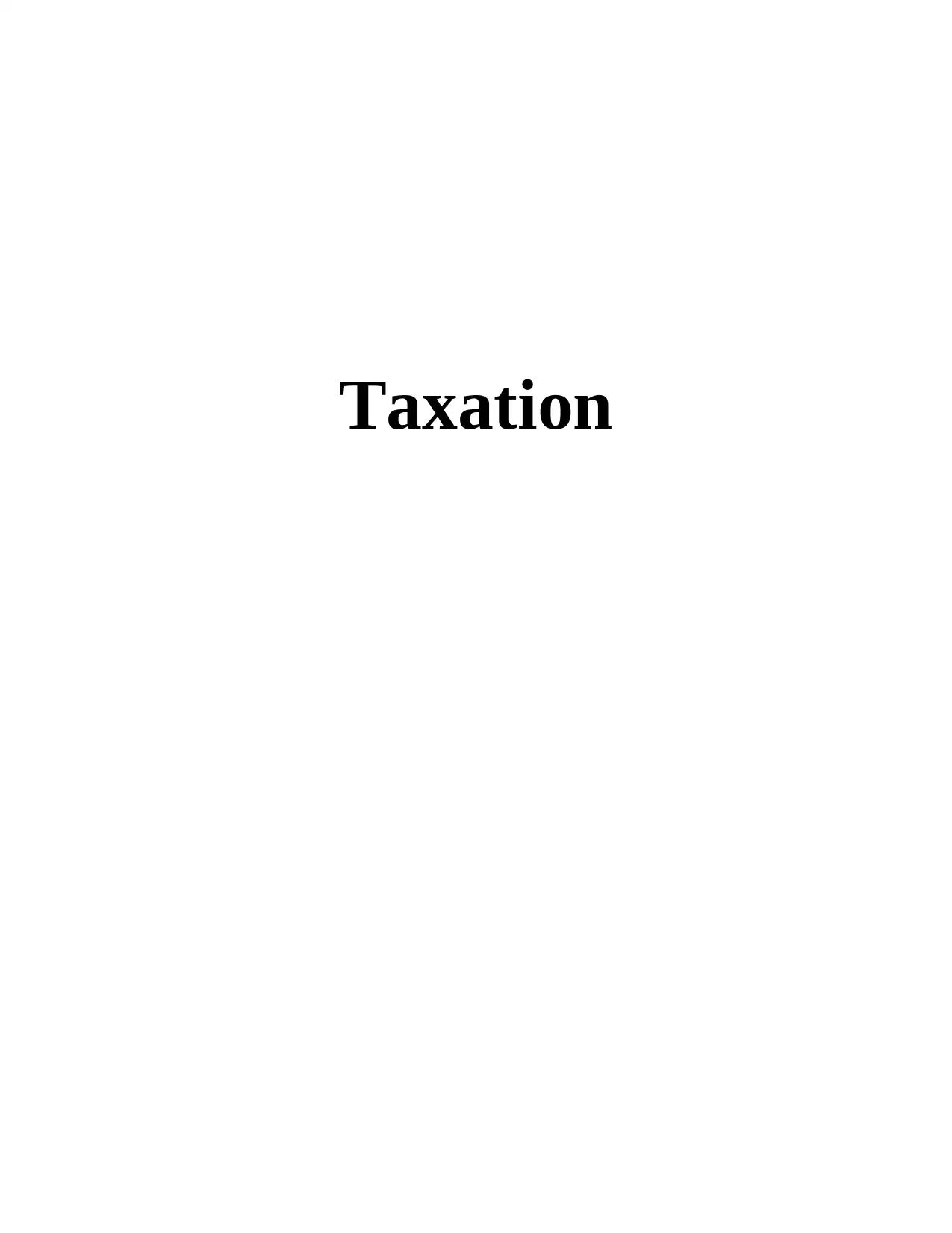
Taxation
Paraphrase This Document
Need a fresh take? Get an instant paraphrase of this document with our AI Paraphraser
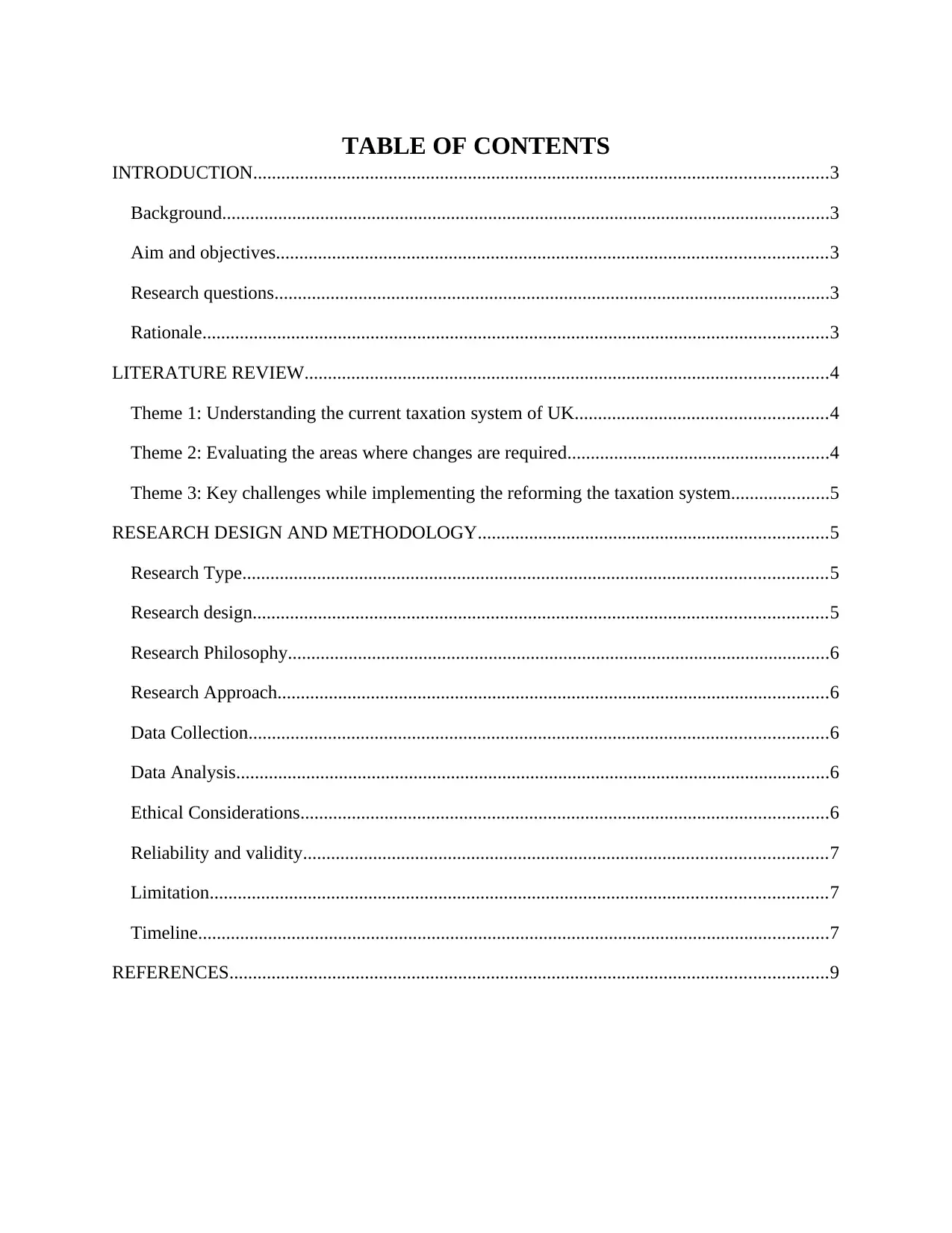
TABLE OF CONTENTS
INTRODUCTION...........................................................................................................................3
Background..................................................................................................................................3
Aim and objectives......................................................................................................................3
Research questions.......................................................................................................................3
Rationale......................................................................................................................................3
LITERATURE REVIEW................................................................................................................4
Theme 1: Understanding the current taxation system of UK......................................................4
Theme 2: Evaluating the areas where changes are required........................................................4
Theme 3: Key challenges while implementing the reforming the taxation system.....................5
RESEARCH DESIGN AND METHODOLOGY...........................................................................5
Research Type.............................................................................................................................5
Research design...........................................................................................................................5
Research Philosophy....................................................................................................................6
Research Approach......................................................................................................................6
Data Collection............................................................................................................................6
Data Analysis...............................................................................................................................6
Ethical Considerations.................................................................................................................6
Reliability and validity................................................................................................................7
Limitation....................................................................................................................................7
Timeline.......................................................................................................................................7
REFERENCES................................................................................................................................9
INTRODUCTION...........................................................................................................................3
Background..................................................................................................................................3
Aim and objectives......................................................................................................................3
Research questions.......................................................................................................................3
Rationale......................................................................................................................................3
LITERATURE REVIEW................................................................................................................4
Theme 1: Understanding the current taxation system of UK......................................................4
Theme 2: Evaluating the areas where changes are required........................................................4
Theme 3: Key challenges while implementing the reforming the taxation system.....................5
RESEARCH DESIGN AND METHODOLOGY...........................................................................5
Research Type.............................................................................................................................5
Research design...........................................................................................................................5
Research Philosophy....................................................................................................................6
Research Approach......................................................................................................................6
Data Collection............................................................................................................................6
Data Analysis...............................................................................................................................6
Ethical Considerations.................................................................................................................6
Reliability and validity................................................................................................................7
Limitation....................................................................................................................................7
Timeline.......................................................................................................................................7
REFERENCES................................................................................................................................9
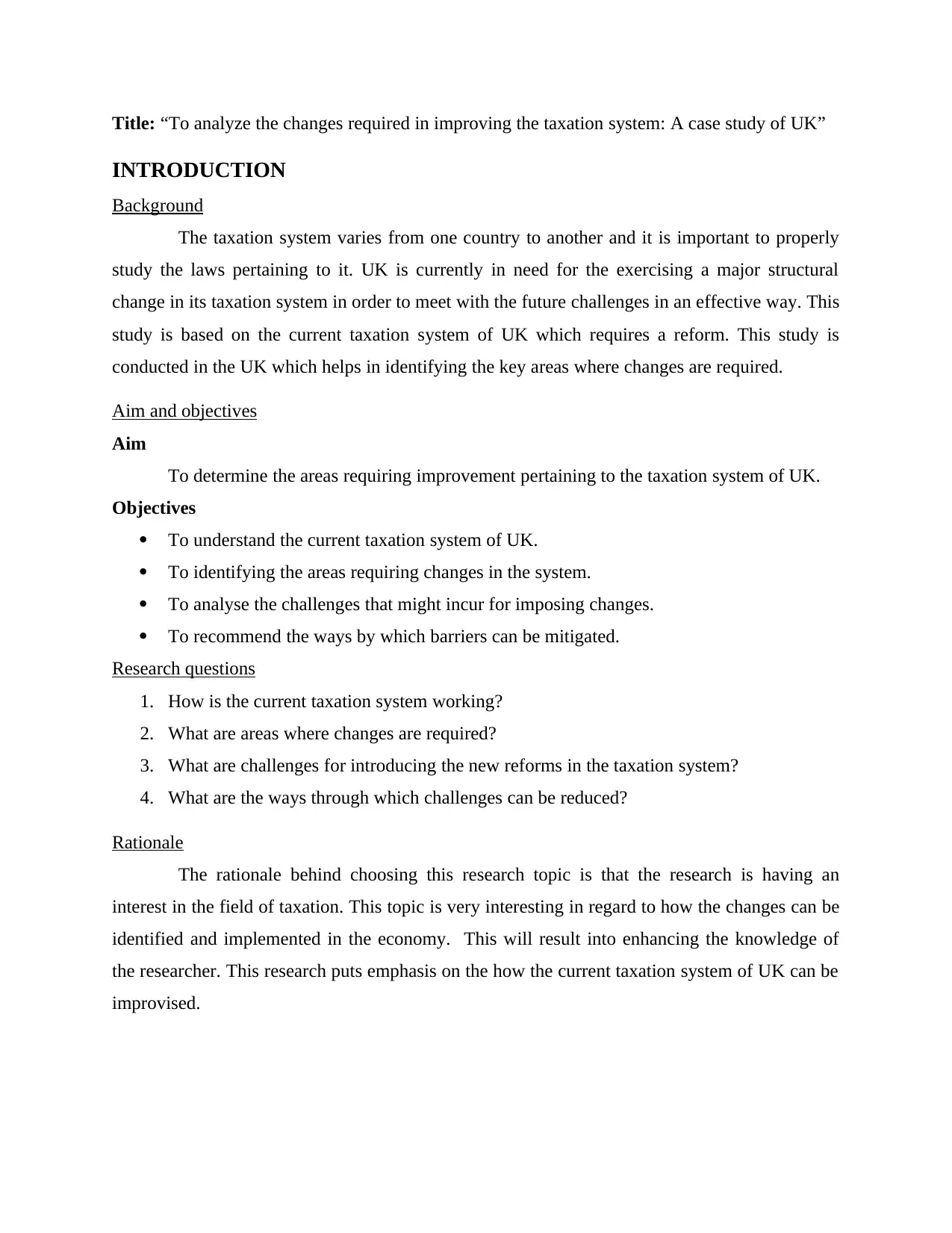
Title: “To analyze the changes required in improving the taxation system: A case study of UK”
INTRODUCTION
Background
The taxation system varies from one country to another and it is important to properly
study the laws pertaining to it. UK is currently in need for the exercising a major structural
change in its taxation system in order to meet with the future challenges in an effective way. This
study is based on the current taxation system of UK which requires a reform. This study is
conducted in the UK which helps in identifying the key areas where changes are required.
Aim and objectives
Aim
To determine the areas requiring improvement pertaining to the taxation system of UK.
Objectives
To understand the current taxation system of UK.
To identifying the areas requiring changes in the system.
To analyse the challenges that might incur for imposing changes.
To recommend the ways by which barriers can be mitigated.
Research questions
1. How is the current taxation system working?
2. What are areas where changes are required?
3. What are challenges for introducing the new reforms in the taxation system?
4. What are the ways through which challenges can be reduced?
Rationale
The rationale behind choosing this research topic is that the research is having an
interest in the field of taxation. This topic is very interesting in regard to how the changes can be
identified and implemented in the economy. This will result into enhancing the knowledge of
the researcher. This research puts emphasis on the how the current taxation system of UK can be
improvised.
INTRODUCTION
Background
The taxation system varies from one country to another and it is important to properly
study the laws pertaining to it. UK is currently in need for the exercising a major structural
change in its taxation system in order to meet with the future challenges in an effective way. This
study is based on the current taxation system of UK which requires a reform. This study is
conducted in the UK which helps in identifying the key areas where changes are required.
Aim and objectives
Aim
To determine the areas requiring improvement pertaining to the taxation system of UK.
Objectives
To understand the current taxation system of UK.
To identifying the areas requiring changes in the system.
To analyse the challenges that might incur for imposing changes.
To recommend the ways by which barriers can be mitigated.
Research questions
1. How is the current taxation system working?
2. What are areas where changes are required?
3. What are challenges for introducing the new reforms in the taxation system?
4. What are the ways through which challenges can be reduced?
Rationale
The rationale behind choosing this research topic is that the research is having an
interest in the field of taxation. This topic is very interesting in regard to how the changes can be
identified and implemented in the economy. This will result into enhancing the knowledge of
the researcher. This research puts emphasis on the how the current taxation system of UK can be
improvised.
⊘ This is a preview!⊘
Do you want full access?
Subscribe today to unlock all pages.

Trusted by 1+ million students worldwide
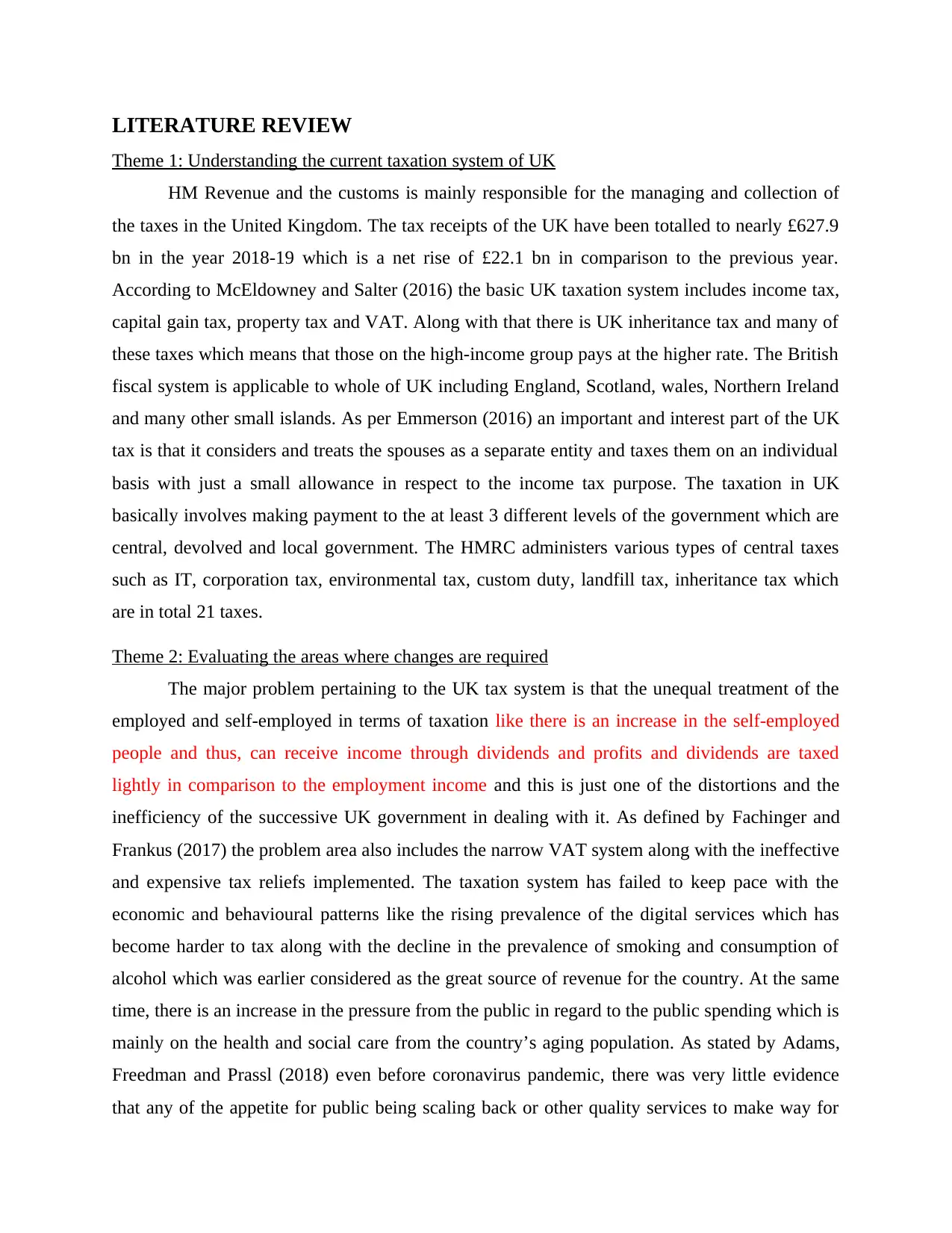
LITERATURE REVIEW
Theme 1: Understanding the current taxation system of UK
HM Revenue and the customs is mainly responsible for the managing and collection of
the taxes in the United Kingdom. The tax receipts of the UK have been totalled to nearly £627.9
bn in the year 2018-19 which is a net rise of £22.1 bn in comparison to the previous year.
According to McEldowney and Salter (2016) the basic UK taxation system includes income tax,
capital gain tax, property tax and VAT. Along with that there is UK inheritance tax and many of
these taxes which means that those on the high-income group pays at the higher rate. The British
fiscal system is applicable to whole of UK including England, Scotland, wales, Northern Ireland
and many other small islands. As per Emmerson (2016) an important and interest part of the UK
tax is that it considers and treats the spouses as a separate entity and taxes them on an individual
basis with just a small allowance in respect to the income tax purpose. The taxation in UK
basically involves making payment to the at least 3 different levels of the government which are
central, devolved and local government. The HMRC administers various types of central taxes
such as IT, corporation tax, environmental tax, custom duty, landfill tax, inheritance tax which
are in total 21 taxes.
Theme 2: Evaluating the areas where changes are required
The major problem pertaining to the UK tax system is that the unequal treatment of the
employed and self-employed in terms of taxation like there is an increase in the self-employed
people and thus, can receive income through dividends and profits and dividends are taxed
lightly in comparison to the employment income and this is just one of the distortions and the
inefficiency of the successive UK government in dealing with it. As defined by Fachinger and
Frankus (2017) the problem area also includes the narrow VAT system along with the ineffective
and expensive tax reliefs implemented. The taxation system has failed to keep pace with the
economic and behavioural patterns like the rising prevalence of the digital services which has
become harder to tax along with the decline in the prevalence of smoking and consumption of
alcohol which was earlier considered as the great source of revenue for the country. At the same
time, there is an increase in the pressure from the public in regard to the public spending which is
mainly on the health and social care from the country’s aging population. As stated by Adams,
Freedman and Prassl (2018) even before coronavirus pandemic, there was very little evidence
that any of the appetite for public being scaling back or other quality services to make way for
Theme 1: Understanding the current taxation system of UK
HM Revenue and the customs is mainly responsible for the managing and collection of
the taxes in the United Kingdom. The tax receipts of the UK have been totalled to nearly £627.9
bn in the year 2018-19 which is a net rise of £22.1 bn in comparison to the previous year.
According to McEldowney and Salter (2016) the basic UK taxation system includes income tax,
capital gain tax, property tax and VAT. Along with that there is UK inheritance tax and many of
these taxes which means that those on the high-income group pays at the higher rate. The British
fiscal system is applicable to whole of UK including England, Scotland, wales, Northern Ireland
and many other small islands. As per Emmerson (2016) an important and interest part of the UK
tax is that it considers and treats the spouses as a separate entity and taxes them on an individual
basis with just a small allowance in respect to the income tax purpose. The taxation in UK
basically involves making payment to the at least 3 different levels of the government which are
central, devolved and local government. The HMRC administers various types of central taxes
such as IT, corporation tax, environmental tax, custom duty, landfill tax, inheritance tax which
are in total 21 taxes.
Theme 2: Evaluating the areas where changes are required
The major problem pertaining to the UK tax system is that the unequal treatment of the
employed and self-employed in terms of taxation like there is an increase in the self-employed
people and thus, can receive income through dividends and profits and dividends are taxed
lightly in comparison to the employment income and this is just one of the distortions and the
inefficiency of the successive UK government in dealing with it. As defined by Fachinger and
Frankus (2017) the problem area also includes the narrow VAT system along with the ineffective
and expensive tax reliefs implemented. The taxation system has failed to keep pace with the
economic and behavioural patterns like the rising prevalence of the digital services which has
become harder to tax along with the decline in the prevalence of smoking and consumption of
alcohol which was earlier considered as the great source of revenue for the country. At the same
time, there is an increase in the pressure from the public in regard to the public spending which is
mainly on the health and social care from the country’s aging population. As stated by Adams,
Freedman and Prassl (2018) even before coronavirus pandemic, there was very little evidence
that any of the appetite for public being scaling back or other quality services to make way for
Paraphrase This Document
Need a fresh take? Get an instant paraphrase of this document with our AI Paraphraser
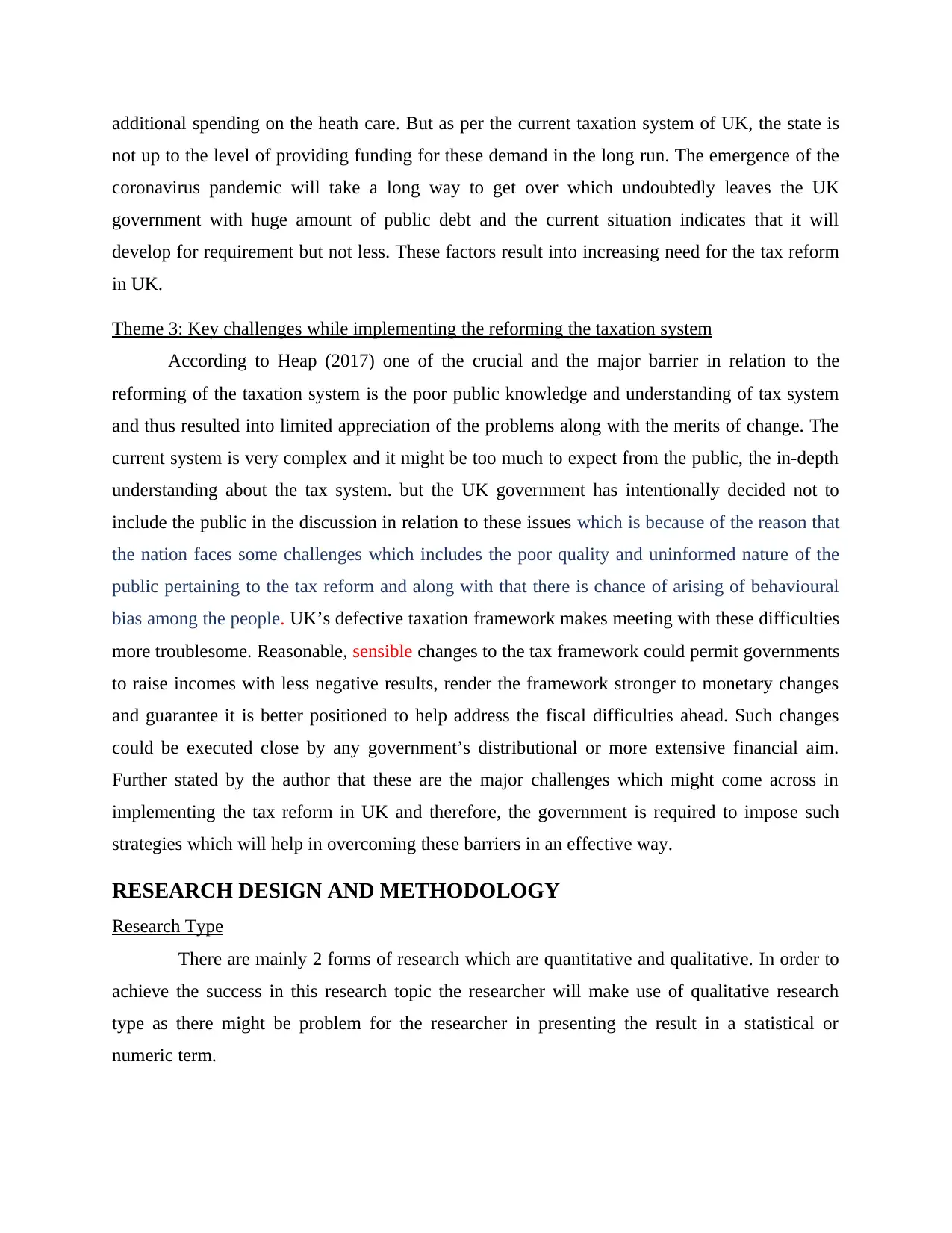
additional spending on the heath care. But as per the current taxation system of UK, the state is
not up to the level of providing funding for these demand in the long run. The emergence of the
coronavirus pandemic will take a long way to get over which undoubtedly leaves the UK
government with huge amount of public debt and the current situation indicates that it will
develop for requirement but not less. These factors result into increasing need for the tax reform
in UK.
Theme 3: Key challenges while implementing the reforming the taxation system
According to Heap (2017) one of the crucial and the major barrier in relation to the
reforming of the taxation system is the poor public knowledge and understanding of tax system
and thus resulted into limited appreciation of the problems along with the merits of change. The
current system is very complex and it might be too much to expect from the public, the in-depth
understanding about the tax system. but the UK government has intentionally decided not to
include the public in the discussion in relation to these issues which is because of the reason that
the nation faces some challenges which includes the poor quality and uninformed nature of the
public pertaining to the tax reform and along with that there is chance of arising of behavioural
bias among the people. UK’s defective taxation framework makes meeting with these difficulties
more troublesome. Reasonable, sensible changes to the tax framework could permit governments
to raise incomes with less negative results, render the framework stronger to monetary changes
and guarantee it is better positioned to help address the fiscal difficulties ahead. Such changes
could be executed close by any government’s distributional or more extensive financial aim.
Further stated by the author that these are the major challenges which might come across in
implementing the tax reform in UK and therefore, the government is required to impose such
strategies which will help in overcoming these barriers in an effective way.
RESEARCH DESIGN AND METHODOLOGY
Research Type
There are mainly 2 forms of research which are quantitative and qualitative. In order to
achieve the success in this research topic the researcher will make use of qualitative research
type as there might be problem for the researcher in presenting the result in a statistical or
numeric term.
not up to the level of providing funding for these demand in the long run. The emergence of the
coronavirus pandemic will take a long way to get over which undoubtedly leaves the UK
government with huge amount of public debt and the current situation indicates that it will
develop for requirement but not less. These factors result into increasing need for the tax reform
in UK.
Theme 3: Key challenges while implementing the reforming the taxation system
According to Heap (2017) one of the crucial and the major barrier in relation to the
reforming of the taxation system is the poor public knowledge and understanding of tax system
and thus resulted into limited appreciation of the problems along with the merits of change. The
current system is very complex and it might be too much to expect from the public, the in-depth
understanding about the tax system. but the UK government has intentionally decided not to
include the public in the discussion in relation to these issues which is because of the reason that
the nation faces some challenges which includes the poor quality and uninformed nature of the
public pertaining to the tax reform and along with that there is chance of arising of behavioural
bias among the people. UK’s defective taxation framework makes meeting with these difficulties
more troublesome. Reasonable, sensible changes to the tax framework could permit governments
to raise incomes with less negative results, render the framework stronger to monetary changes
and guarantee it is better positioned to help address the fiscal difficulties ahead. Such changes
could be executed close by any government’s distributional or more extensive financial aim.
Further stated by the author that these are the major challenges which might come across in
implementing the tax reform in UK and therefore, the government is required to impose such
strategies which will help in overcoming these barriers in an effective way.
RESEARCH DESIGN AND METHODOLOGY
Research Type
There are mainly 2 forms of research which are quantitative and qualitative. In order to
achieve the success in this research topic the researcher will make use of qualitative research
type as there might be problem for the researcher in presenting the result in a statistical or
numeric term.
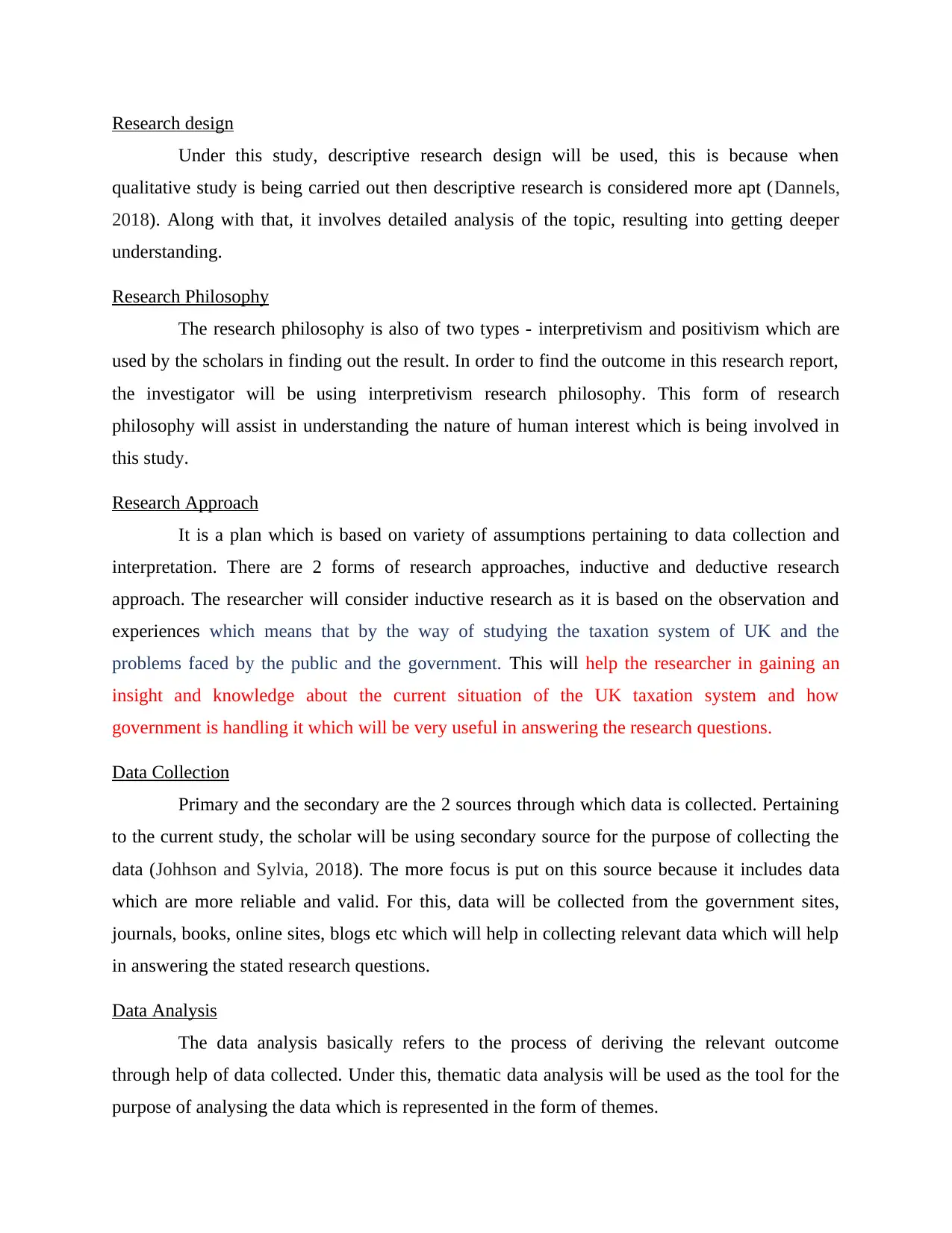
Research design
Under this study, descriptive research design will be used, this is because when
qualitative study is being carried out then descriptive research is considered more apt (Dannels,
2018). Along with that, it involves detailed analysis of the topic, resulting into getting deeper
understanding.
Research Philosophy
The research philosophy is also of two types - interpretivism and positivism which are
used by the scholars in finding out the result. In order to find the outcome in this research report,
the investigator will be using interpretivism research philosophy. This form of research
philosophy will assist in understanding the nature of human interest which is being involved in
this study.
Research Approach
It is a plan which is based on variety of assumptions pertaining to data collection and
interpretation. There are 2 forms of research approaches, inductive and deductive research
approach. The researcher will consider inductive research as it is based on the observation and
experiences which means that by the way of studying the taxation system of UK and the
problems faced by the public and the government. This will help the researcher in gaining an
insight and knowledge about the current situation of the UK taxation system and how
government is handling it which will be very useful in answering the research questions.
Data Collection
Primary and the secondary are the 2 sources through which data is collected. Pertaining
to the current study, the scholar will be using secondary source for the purpose of collecting the
data (Johhson and Sylvia, 2018). The more focus is put on this source because it includes data
which are more reliable and valid. For this, data will be collected from the government sites,
journals, books, online sites, blogs etc which will help in collecting relevant data which will help
in answering the stated research questions.
Data Analysis
The data analysis basically refers to the process of deriving the relevant outcome
through help of data collected. Under this, thematic data analysis will be used as the tool for the
purpose of analysing the data which is represented in the form of themes.
Under this study, descriptive research design will be used, this is because when
qualitative study is being carried out then descriptive research is considered more apt (Dannels,
2018). Along with that, it involves detailed analysis of the topic, resulting into getting deeper
understanding.
Research Philosophy
The research philosophy is also of two types - interpretivism and positivism which are
used by the scholars in finding out the result. In order to find the outcome in this research report,
the investigator will be using interpretivism research philosophy. This form of research
philosophy will assist in understanding the nature of human interest which is being involved in
this study.
Research Approach
It is a plan which is based on variety of assumptions pertaining to data collection and
interpretation. There are 2 forms of research approaches, inductive and deductive research
approach. The researcher will consider inductive research as it is based on the observation and
experiences which means that by the way of studying the taxation system of UK and the
problems faced by the public and the government. This will help the researcher in gaining an
insight and knowledge about the current situation of the UK taxation system and how
government is handling it which will be very useful in answering the research questions.
Data Collection
Primary and the secondary are the 2 sources through which data is collected. Pertaining
to the current study, the scholar will be using secondary source for the purpose of collecting the
data (Johhson and Sylvia, 2018). The more focus is put on this source because it includes data
which are more reliable and valid. For this, data will be collected from the government sites,
journals, books, online sites, blogs etc which will help in collecting relevant data which will help
in answering the stated research questions.
Data Analysis
The data analysis basically refers to the process of deriving the relevant outcome
through help of data collected. Under this, thematic data analysis will be used as the tool for the
purpose of analysing the data which is represented in the form of themes.
⊘ This is a preview!⊘
Do you want full access?
Subscribe today to unlock all pages.

Trusted by 1+ million students worldwide
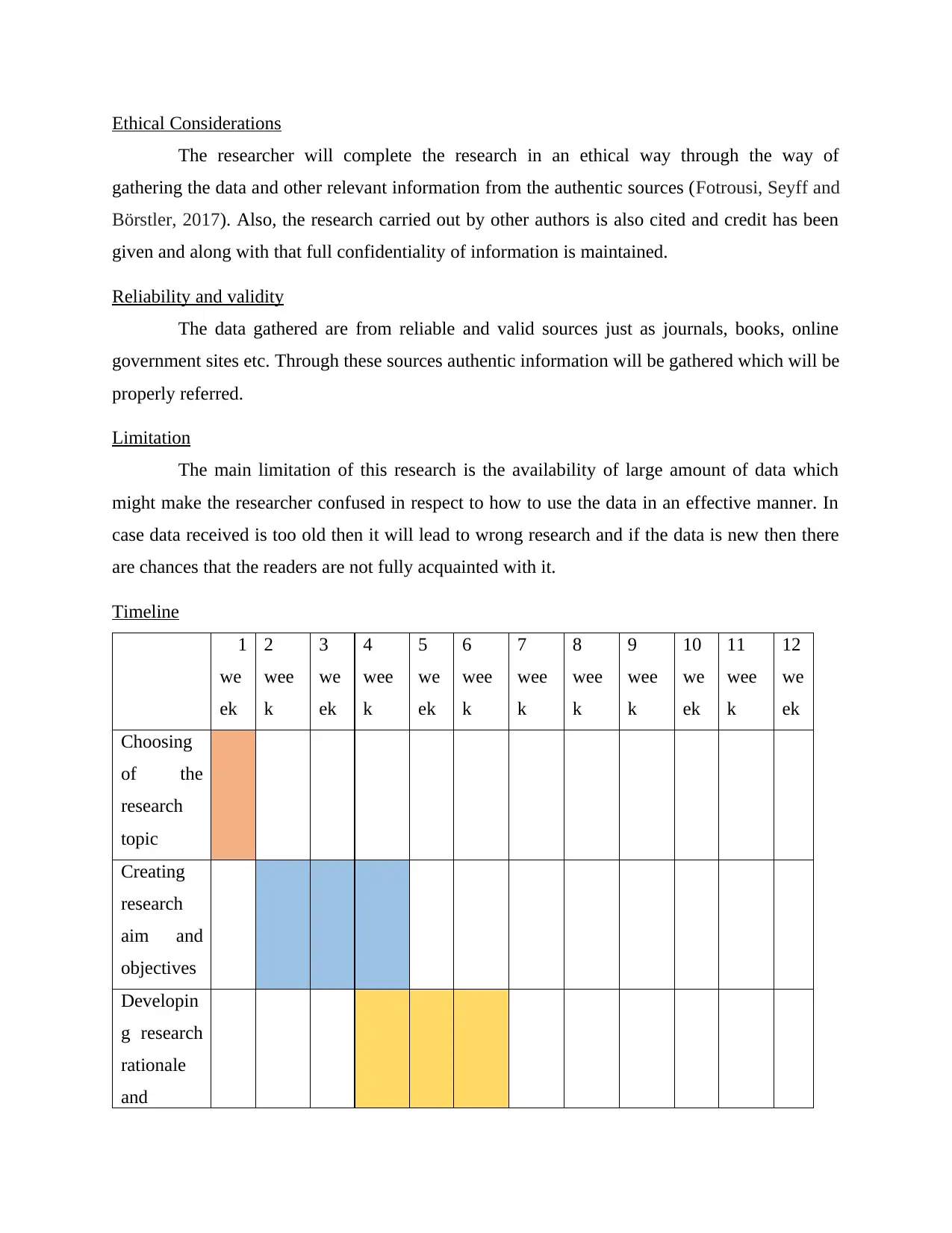
Ethical Considerations
The researcher will complete the research in an ethical way through the way of
gathering the data and other relevant information from the authentic sources (Fotrousi, Seyff and
Börstler, 2017). Also, the research carried out by other authors is also cited and credit has been
given and along with that full confidentiality of information is maintained.
Reliability and validity
The data gathered are from reliable and valid sources just as journals, books, online
government sites etc. Through these sources authentic information will be gathered which will be
properly referred.
Limitation
The main limitation of this research is the availability of large amount of data which
might make the researcher confused in respect to how to use the data in an effective manner. In
case data received is too old then it will lead to wrong research and if the data is new then there
are chances that the readers are not fully acquainted with it.
Timeline
1
we
ek
2
wee
k
3
we
ek
4
wee
k
5
we
ek
6
wee
k
7
wee
k
8
wee
k
9
wee
k
10
we
ek
11
wee
k
12
we
ek
Choosing
of the
research
topic
Creating
research
aim and
objectives
Developin
g research
rationale
and
The researcher will complete the research in an ethical way through the way of
gathering the data and other relevant information from the authentic sources (Fotrousi, Seyff and
Börstler, 2017). Also, the research carried out by other authors is also cited and credit has been
given and along with that full confidentiality of information is maintained.
Reliability and validity
The data gathered are from reliable and valid sources just as journals, books, online
government sites etc. Through these sources authentic information will be gathered which will be
properly referred.
Limitation
The main limitation of this research is the availability of large amount of data which
might make the researcher confused in respect to how to use the data in an effective manner. In
case data received is too old then it will lead to wrong research and if the data is new then there
are chances that the readers are not fully acquainted with it.
Timeline
1
we
ek
2
wee
k
3
we
ek
4
wee
k
5
we
ek
6
wee
k
7
wee
k
8
wee
k
9
wee
k
10
we
ek
11
wee
k
12
we
ek
Choosing
of the
research
topic
Creating
research
aim and
objectives
Developin
g research
rationale
and
Paraphrase This Document
Need a fresh take? Get an instant paraphrase of this document with our AI Paraphraser
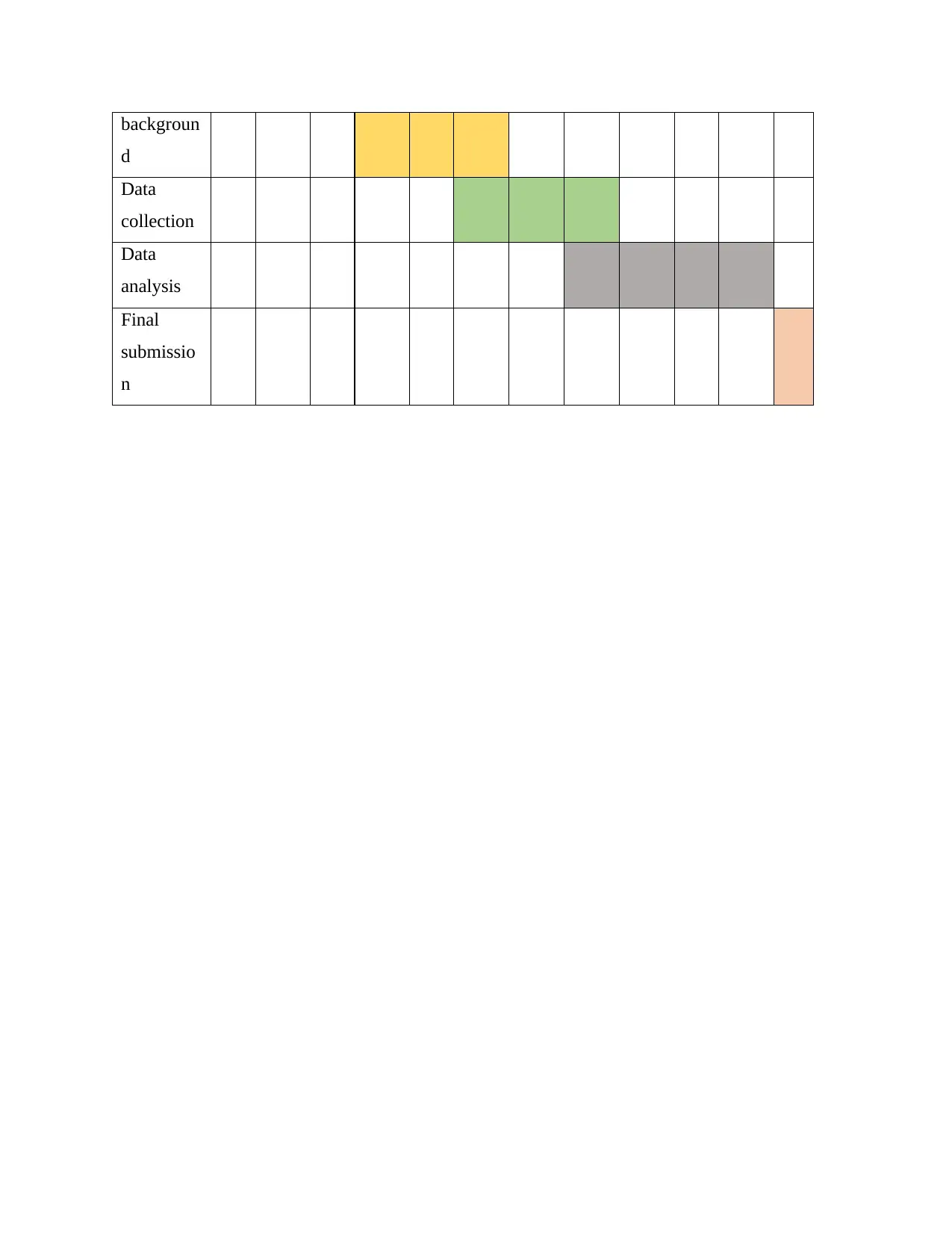
backgroun
d
Data
collection
Data
analysis
Final
submissio
n
d
Data
collection
Data
analysis
Final
submissio
n
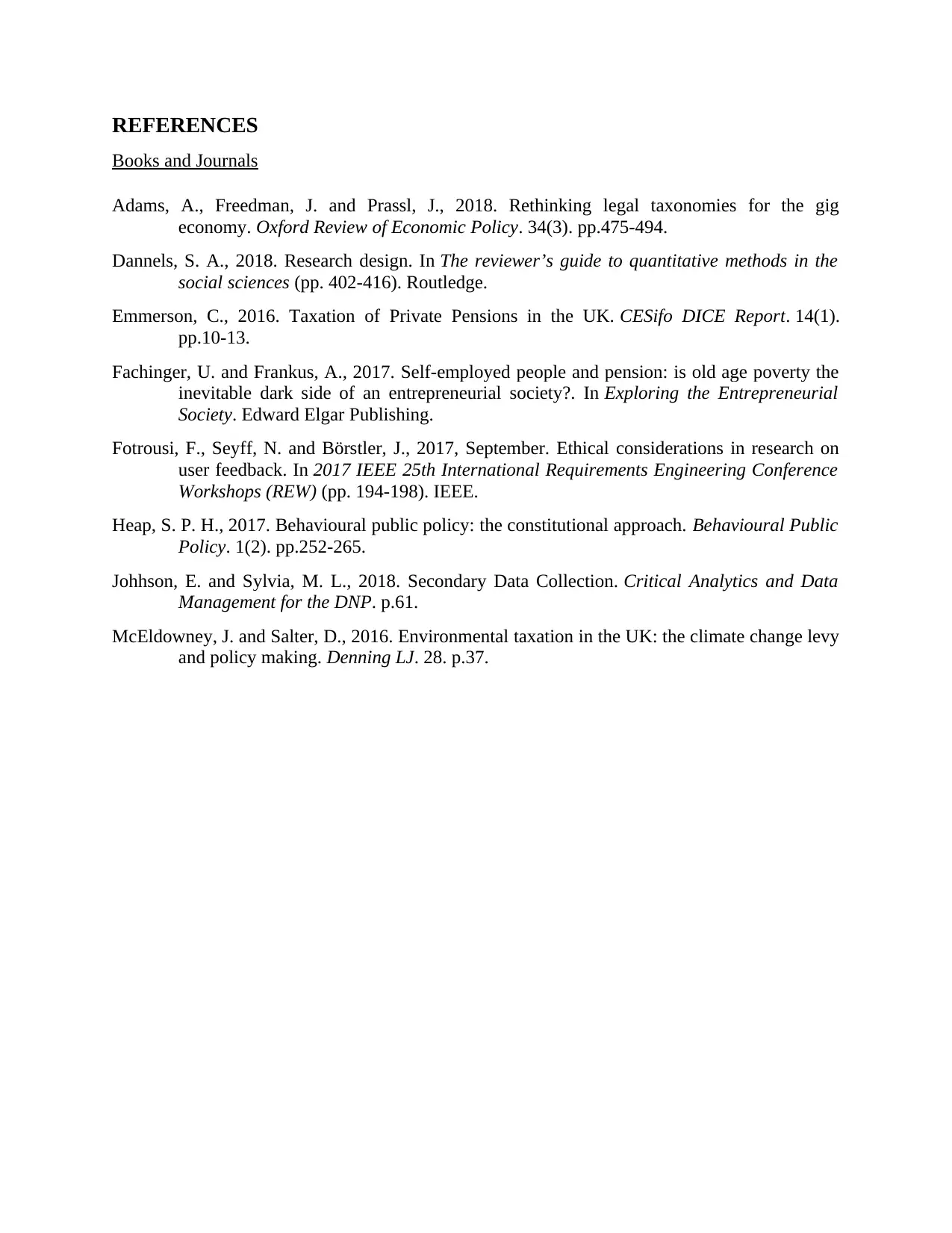
REFERENCES
Books and Journals
Adams, A., Freedman, J. and Prassl, J., 2018. Rethinking legal taxonomies for the gig
economy. Oxford Review of Economic Policy. 34(3). pp.475-494.
Dannels, S. A., 2018. Research design. In The reviewer’s guide to quantitative methods in the
social sciences (pp. 402-416). Routledge.
Emmerson, C., 2016. Taxation of Private Pensions in the UK. CESifo DICE Report. 14(1).
pp.10-13.
Fachinger, U. and Frankus, A., 2017. Self-employed people and pension: is old age poverty the
inevitable dark side of an entrepreneurial society?. In Exploring the Entrepreneurial
Society. Edward Elgar Publishing.
Fotrousi, F., Seyff, N. and Börstler, J., 2017, September. Ethical considerations in research on
user feedback. In 2017 IEEE 25th International Requirements Engineering Conference
Workshops (REW) (pp. 194-198). IEEE.
Heap, S. P. H., 2017. Behavioural public policy: the constitutional approach. Behavioural Public
Policy. 1(2). pp.252-265.
Johhson, E. and Sylvia, M. L., 2018. Secondary Data Collection. Critical Analytics and Data
Management for the DNP. p.61.
McEldowney, J. and Salter, D., 2016. Environmental taxation in the UK: the climate change levy
and policy making. Denning LJ. 28. p.37.
Books and Journals
Adams, A., Freedman, J. and Prassl, J., 2018. Rethinking legal taxonomies for the gig
economy. Oxford Review of Economic Policy. 34(3). pp.475-494.
Dannels, S. A., 2018. Research design. In The reviewer’s guide to quantitative methods in the
social sciences (pp. 402-416). Routledge.
Emmerson, C., 2016. Taxation of Private Pensions in the UK. CESifo DICE Report. 14(1).
pp.10-13.
Fachinger, U. and Frankus, A., 2017. Self-employed people and pension: is old age poverty the
inevitable dark side of an entrepreneurial society?. In Exploring the Entrepreneurial
Society. Edward Elgar Publishing.
Fotrousi, F., Seyff, N. and Börstler, J., 2017, September. Ethical considerations in research on
user feedback. In 2017 IEEE 25th International Requirements Engineering Conference
Workshops (REW) (pp. 194-198). IEEE.
Heap, S. P. H., 2017. Behavioural public policy: the constitutional approach. Behavioural Public
Policy. 1(2). pp.252-265.
Johhson, E. and Sylvia, M. L., 2018. Secondary Data Collection. Critical Analytics and Data
Management for the DNP. p.61.
McEldowney, J. and Salter, D., 2016. Environmental taxation in the UK: the climate change levy
and policy making. Denning LJ. 28. p.37.
⊘ This is a preview!⊘
Do you want full access?
Subscribe today to unlock all pages.

Trusted by 1+ million students worldwide
1 out of 9
Related Documents
Your All-in-One AI-Powered Toolkit for Academic Success.
+13062052269
info@desklib.com
Available 24*7 on WhatsApp / Email
![[object Object]](/_next/static/media/star-bottom.7253800d.svg)
Unlock your academic potential
Copyright © 2020–2026 A2Z Services. All Rights Reserved. Developed and managed by ZUCOL.





